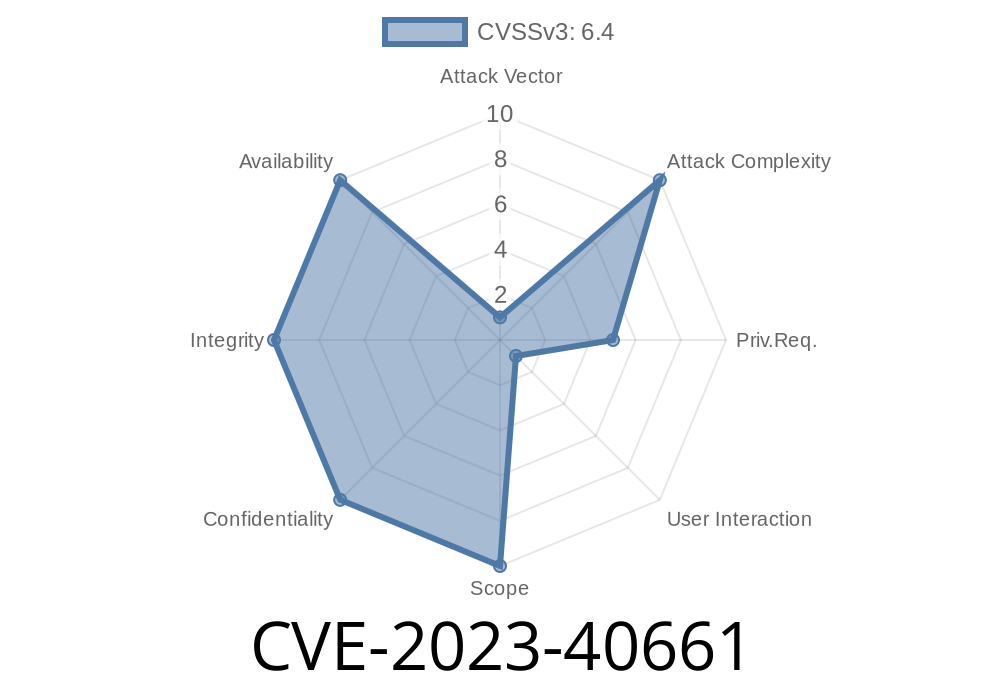OpenSC is a popular suite used for smart card operations—everything from digital signature to user authentication. Notably, it features command line tools like pkcs15-init for initializing and enrolling new cards. But in 2023, security researchers discovered a series of memory vulnerabilities, tracked as CVE-2023-40661, that could let a hands-on attacker inject rogue data into the enrollment process. Let me break down how this works, why it’s dangerous, and what you can do about it.
What’s CVE-2023-40661 All About?
To get straight to the point:
When you or an admin uses OpenSC tools like pkcs15-init to set up a card (load keys/certs, enroll a user, etc.), OpenSC exchanges a lot of messages with the smart card using APDUs—Application Protocol Data Units.
CVE-2023-40661 happens because several places in OpenSC’s code don’t properly check the size and content of what the cards send back. A specially crafted card—say, a fake smart card or a USB dongle made by an attacker—can respond with bigger, smaller, or weirdly structured messages than expected. This can crash the application, corrupt memory, or in the worst case, allow code execution or manipulation of card data.
References:
- Debian Security Advisory on CVE-2023-40661
- OpenSC GitHub Security Issue #2541
- NVD Summary
Why Does Physical Access Matter?
Unlike remote exploits, this vulnerability requires someone to be *physically* at your machine. That may sound less risky, but in organizations where many people have access to workstations—like in banks, government offices, or airports—a malicious contractor or intruder could take advantage by simply plugging in a “smart” USB key or card reader.
Craft a Malicious USB Device or Smart Card
This device must be programmable and able to imitate APDU responses. Tools like Proxmark3, ChameleonMini, or even Raspberry Pi with USB gadget mode can do the trick.
Connect Device During Enrollment
The attacker waits for a moment when an admin or user enrolls a new card using pkcs15-init (or scripts built with OpenSC’s libraries).
Respond to APDU Commands with Bad Data
Here’s the twist: instead of acting like a normal card, the device sends back *oversized* or *malformed* responses to certain commands—say, during key generation, certificate storage, or PIN setting.
Trigger Memory Error in OpenSC
OpenSC, expecting a well-formed response, allocates buffers or copies data unsafely. This opens doors for:
Memory corruption (potential code execution or info leak)
- Manipulation of cryptographic keys or certificates being imported/generated
Here’s a simplified version (not actual OpenSC code) of what goes wrong
// A simplified unsafe copy from card response
unsigned char buffer[256];
int received = send_apdu(card, cmd, buffer, sizeof(buffer));
// Vulnerability: 'received' could be larger than 'buffer'
memcpy(data, buffer, received); // No bounds check!
// Data from card could overwrite adjacent memory
When the attack device makes received bigger than 256, the buffer overflows—corrupting memory.
Exploit Demo (Pseudocode)
Suppose you build a fake smart card that, when it gets the “give me your certificate” command, replies:
malicious_response = b"\xFF" * 1024 # 1024-byte junk, instead of expected 64 bytes
send_to_opensc(malicious_response)
If OpenSC doesn’t check the response length, it will copy all 1024 bytes into a smaller memory area, which might let you:
Proof-of-Concept Resources
- Reproducing with Proxmark3
- ChameleonMini Docs
Real-World Impact
- Key Generation Compromise: The attacker could tamper with the random data, or even swap the key being created.
Is This Just a Theoretical Threat?
Nope! These issues are very real for environments where card enrollment happens at many desks, or via kiosks—like issuing government IDs or badges. Since OpenSC is widely used, and staff may not be careful about what device they plug in, the risk is tangible.
What You Should Do
- Update OpenSC: Make sure you’re running the latest, patched version. Developers have added proper bounds checks and data validation in recent releases.
- Check OpenSC Releases
- Lock Down Physical Access: Don’t leave enrollment workstations unattended. Discourage staff from plugging in unknown USB or card devices.
Conclusion
CVE-2023-40661 is a reminder that memory safety still matters—even in “offline” tools like smart card utilities. Physical access + creative devices = serious risk, especially in high-security sectors.
Stay up to date, and treat every USB/smart card as a potential attacker!
*For more information, see the official OpenSC advisory, Debian's security bulletin, and always keep your crypto toolbox patched.*
Timeline
Published on: 11/06/2023 17:15:11 UTC
Last modified on: 11/14/2023 17:11:38 UTC
